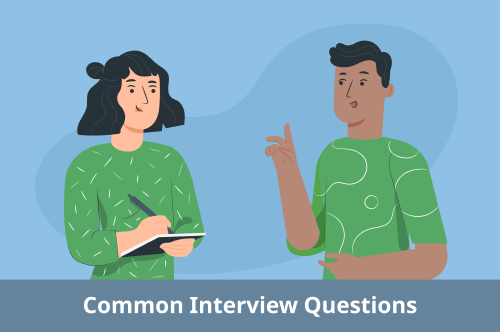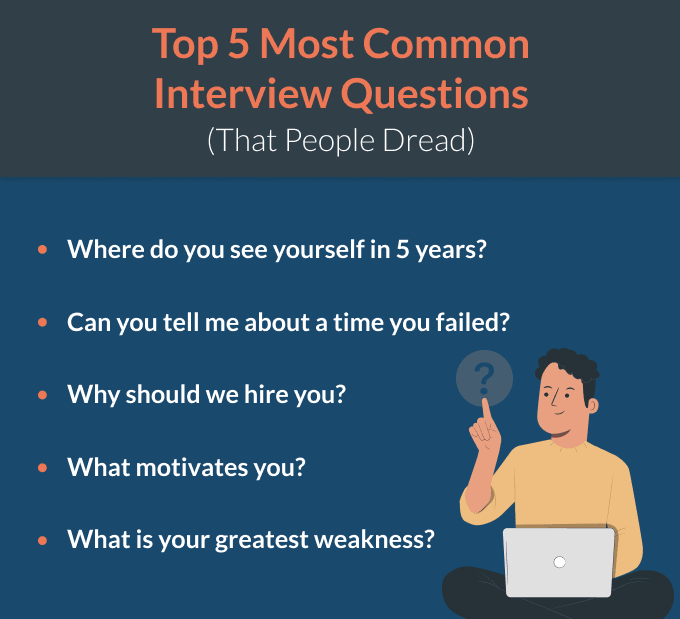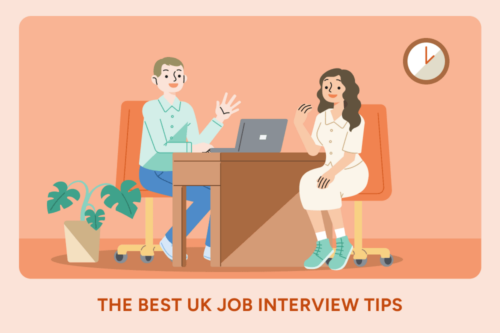With millions of UK professionals quitting their jobs to find better work, chances are you could use some expert interview tips.
While you can never predict exactly what you’ll be asked in an interview, you can prepare for some of the most common questions.
We recommend against reciting a canned response because you’ll likely come across as stiff, but you can use this list to help you get more comfortable answering potential questions so that you’re more prepared going into your next interview. Let’s get started, shall we?
1. How did you hear about this position?
‘How did you hear about this position?’ is typically one of the first questions interviewers ask.
If a current employee of the company referred you, this is the time to tell the interviewer. Mentioning a mutual connection can help establish a rapport with the interviewer and tells them that someone they work with already has confidence in your abilities.
If you found the position through a recruiter or your own research, be sure to explain what drew you to apply in the first place. Were you attracted to the office culture? Are you passionate about the products or the mission of the company? Be specific about why you think you’d be a good fit.
Sample answer
“I heard about the open position from my friend Jonathan, who works at ABC Corp in the marketing team. I’ve actually admired the work being done by ABC Corp for a while now, and thought the office manager role would be a great fit for me.”
2. What’s your ideal work environment?
Interviewers frequently ask this question to determine whether you’d be a good fit for the company’s office and management style.
While there’s no one right answer here, the best approach is to say your ideal work environment is similar to the one at the organisation you’re interviewing with. If you’re not sure what type of environment that is, look at the company’s official social media to get a better idea of how they portray themselves.
Some companies are more rigid and hierarchical, while others (like startups) are relaxed and try to foster more creative environments.
Sample answer
“I’d say my ideal work environment is relaxed and collaborative. I appreciate having the space to try new approaches and work with my coworkers to find creative solutions to problems. I really enjoy thinking things through with other people, and am usually very close with my coworkers both in and out of the office. In fact, I still meet regularly with a few of my former coworkers from my first job after uni to have a kickabout every weekend.”
3. What style of management do you work best with?
Similar to the last question, interviewers often ask about what management style you prefer to get a better idea of how you would interact with your potential manager.
You’re especially likely to run into this question if the person interviewing you is the same person who would manage you if hired.
The best way to answer this question is by being upfront about your preferences.
Sample answer
“My ideal management style is hands-off but supportive. I work best when I have space to work things out for myself and learn from my mistakes, but I also appreciate it when I can rely on my manager to be there for me if I have questions or problems.”
4. Can you describe a challenging situation at work and how you handled it?
This question is a favourite of many employers because it gives them insight into how you approach problems, handle stress, and how eager you are to tackle new challenges.
Before going into any interview, think of a time you ran into a problem at work and how you resolved it. Then, keep that example in your head so that you don’t have to pause and think for too long in the moment.
Sample answer
“I was recently put in charge of an app development project that was well behind schedule and over budget. I quickly assessed the situation and developed a plan to get the project back on track. The situation was challenging because there was a lot at stake, but I was able to salvage most of the project and met all of my deadlines. In the end, the client was very happy with the results. Handling unexpected challenges like this is something that I find motivating and that I excel at.”
This type of question is common in Civil Service interviews. If you’re applying to the Civil Service, learn how to answer Civil Service Behaviours questions first.
5. Where do you see yourself in 5 years?
‘Where do you see yourself in 5 years?’ is a classic interview question that’s dreaded by many job applicants because it’s difficult to answer without preparation.
Many people make the mistake of providing either a sarcastic (i.e. ‘I see myself with your job’) or uninspired (i.e. ‘I see myself working in this position’) response to this question.
However, what employers are looking for is an answer that suggests you’re ambitious but still have realistic expectations for your career.
To nail your answer, think about how the position you’re interviewing for fits into your overall career trajectory. If you believe the position will get you a step closer to your career goals or help you develop valuable skills for your CV, but you don’t plan on staying with the company for five years, that’s okay – simply be honest about your intentions.
Employers just want to see how the position you’re applying for fits into your aspirations, and whether or not you’re a goal-oriented person.
Sample answer
“In five years I see myself having honed my talents as a graphic designer and starting to take on more responsibilities in a managerial capacity. Specifically, I’d like to work closely with clients in the nonprofit sector to help them identify and develop their branding identity and then work out that vision with a team of designers that I could train and help guide. I feel that this position will help me develop some of the important client-management skills I need to achieve my goals, while giving me the opportunity to work on some exciting projects.”
6. Can you tell me about a time you failed?
Answering any question about your failures can feel like walking into a minefield. Fortunately, if you prepare ahead of time you’ll be able to tackle this common interview question with ease.
The best way to approach this question is by using the STAR method to describe a Situation where you failed, the Task you were given to fix the Situation, the Action you took, and the Result, which should be a positive outcome.
Explain what happened, and finally what you learnt from the experience and how you’ve applied the lesson to your career.
Sample answer
“As a team leader at my previous job, I was tasked with training and guiding new hires. For me, I consider it a failure if someone I’m managing doesn’t feel like they have the support they need to do their job properly. The second person I hired I thought was doing fine for a while. However, about four months into their training I realised that they hadn’t grasped some of the basics of the job, and instead had been going to their coworkers to help them pick up the slack. Over time, this was having a negative impact on the rest of the team’s performance, and upper management started to notice.
Ultimately, this was my failure because it was my job to make sure this employee was confident in their role and felt comfortable coming to me with questions. Since this experience, I started using a more hands-on approach to training and checking in regularly with the people I manage. This method helps me understand where each employee is in their learning process and to provide everyone with the resources they need to grow into their roles.”
7. Why should we hire you?
‘Why should we hire you?’ is a question that throws a lot of interviewees off because it’s so direct. However, this interview question is actually the perfect opportunity to sell yourself as a candidate.
Your answer should explain why you’re qualified for the position, referring back to your well-written CV, with some examples of your achievements and experience to back up your claim.
Remember to avoid boasting or coming across as desperate. For example, if you’re applying for a sales position, don’t start off with ‘Because I’m the finest salesperson you’ll ever see!’ because this sounds overconfident and unrealistic. Instead, simply state your case in a professional manner.
Sample answer
“Well, I think you should hire me because I have the right experience for the position and I’m confident I could bring value to your company. I’ve worked in IT support for six years now and have experience troubleshooting a variety of different issues, even those outside my job description. I love learning about new technologies, and am extremely passionate about finding efficient solutions to issues. In fact, in my last position I received an award for closing the most helpdesk tickets over the course of a year.”
8. What motivates you?
Being asked what motivates you can feel a bit existential at first, but don’t worry. What interviewers really want to know is what aspect of your work most excites you.
Your answer helps them get a better understanding of how you approach your work, and what kind of role you’d fit best in.
The best way to answer this interview question is by being honest about what motivates you at work, or at least the part of your job that you find most rewarding.
Sample answer
“As an educator, I’m motivated by seeing my students get excited about a topic. Frequently when you’re in a classroom it can feel like you’re not getting through to the kids. With so many distractions available to them, something like British history can seem quite dull. But every once in a while the effort pays off and you can see their eyes light up during a discussion or a project. Those moments are really special and are what push me to improve in my job.”
9. Why do you want to work for us?
‘Why do you want to work for us?’ is another intimidatingly forward interview question, but with some preparation it’s an easy one to answer convincingly.
The ideal way to respond this question is by focusing on the specific company you’re interviewing with. Explain what it is about the company culture or the work being done there that made you want to apply for that position in particular.
What you don’t want to do is provide a generic answer that could apply to any other job, or a response that makes you seem uninterested in the job (i.e. ‘I need money and this company pays well’).
Sample answer
“I’m very passionate about developing a personal relationship with the clients I work with. I’ve brought my own pets to Manchester Veterinary before and your reputation for excellent service is fully deserved. After graduating from veterinary school, I wanted to work at a vet’s practice that provides top service. When I saw that Manchester Veterinary was hiring I was quite excited because your approach to service and the attention your vets provide the animals here is aligned with my personal values.”
10. What are your greatest strengths?
Sometimes paired with your weaknesses in the classic ‘what are your strengths and weaknesses?’ interview question, this query is a great opportunity to highlight your qualifications in the interview.
However, don’t just list all your positive attributes. Instead, focus on one to three strengths from your CV that directly apply to the job you’re interviewing for.
Then, provide real-life examples that demonstrate how your strengths have benefitted you professionally.
Sample answer
“My greatest professional strength is my ability to think outside the box and come up with innovative solutions to problems. I have a knack for seeing things from a different perspective and thinking of ways to improve or change things that others might see as working just fine.
Recently, I discovered an issue with one of our company’s websites. It was loading slowly, and I spoke with my manager about how it was negatively impacting user experience. I suspected it was due to a large image file that was being bogged down by the server, and after some trial and error, I finally found the root cause of the problem and implemented a solution that fixed the issue.”
11. What is your greatest weakness?
‘What are your weaknesses?’ is a standard interview question that trips up even experienced job applicants.
This is a particularly tough question to answer because your answer needs to be honest without making you appear less qualified for the job.
The best way to respond is by giving an example of an actual weakness you have that wouldn’t directly impact your ability to do your job. Additionally, you should mention that you’re actively working to compensate for your weakness in some way.
Avoid providing a humble-brag answer to the ‘greatest weakness’ question. Interviewers know that you’re not actually ‘too much of a perfectionist’ and will think you’re just dodging the question.
Sample answer
“As a manager, it’s hard for me to give up control and let other people do their jobs. I have a clear vision of what I want to achieve and the steps necessary to get there. This can sometimes make it difficult for me to delegate work and trust that things will get done the way I want them done.
I’ve been working on this issue by focusing on setting clear expectations up front and by making sure that I’m regularly checking in with team members to see how they’re doing and if they need any help. By giving the team more freedom, I’m also realising that my way isn’t necessarily the best way. They’ll often provide valuable input that results in the end product being a lot better than it would’ve been if we had done things my way.
12. What is your greatest accomplishment?
Interviewers like to ask this question to see what you’re capable of if they decide to hire you.
Don’t be intimidated by how broad this question is. Instead, focus on one of your most impressive professional or academic achievements and briefly explain why you’re proud of it.
Be sure to include any details that help show the interviewer why your achievement was impressive and how it happened because of the actions you took.
Sample answer
“I successfully closed a £1.5 million deal that the other party had nearly given up on. My client had been trying to close this deal for over a year, and it had gone through numerous rounds of negotiations with no success. The other side had basically written it off as a loss, but I was able to revive the deal by proposing a new solution that satisfied everyone involved. It was a major accomplishment because it not only saved my client’s business, but it also strengthened our relationship with the other company and helped to open up new opportunities for future deals.”
13. Can you tell me about yourself?
If you’re not prepared, being asked ‘tell me about yourself‘ can easily cause you to stumble. After all, where do you even start?
What interviewers want to hear when they ask this question isn’t a complete history of your life, or even your career. Instead, they want a concise summary of your experience and why you’re a good fit for the role.
A good formula to follow is to highlight the following information (in order):
- Your present role (your current responsibilities and achievements)
- Your past experience (how you got to where you are now)
- Your future ambitions (why you’re interested in changing jobs)
Sample answer
“Sure! My name is Kelly and I’m a software engineer at ABC Corp. I’ve got more than three years of experience and a degree in computer science from Durham University. I really thrive in environments where I can collaborate with people to develop creative solutions to issues. While I’ve enjoyed my time working at ABC Corp, I’m interested in gaining experience in cloud computing, and I feel the position at Net Source would be an excellent opportunity for me to expand my career and explore the parts of engineering that really excite me.”
14. What do you like least about your job?
You should be especially careful when answering this interview question, because it’s easy to accidentally come across as overly negative.
What employers want to hear is what you’re looking for in this new position that you aren’t getting from your current one.
No matter what, don’t use this as an excuse to rant about your current job, coworkers, or boss. Instead, focus on the positive aspects of your job while politely explaining why you’ve decided to leave. For example, if you feel you don’t have enough opportunities for growth in your current role, this is a good thing to highlight in your response.
Sample answer
“In general, I’m very happy with my job and the people I work with. However, I’m always looking for ways to improve and grow in my career. I feel like the professional development opportunities at my current company are limited, and I’m ready to take on a new challenge.
I believe that my excellent organisational skills and background as an administrator make me a perfect fit for a personal assistant role and I’d love the opportunity to further develop my skills at your company.”
15. What are your salary expectations?
While most interviewers won’t ask you this question, it’s very important to be prepared for it just in case.
The only way to answer questions about your salary expectations properly is to do your research ahead of time. Check websites like Glassdoor or Reed to find out what the average salary for similar positions is.
If you already have plenty of experience in your field, you should already have an approximate idea of what salary you deserve based on your experience and skills, and should politely state your preferred number to the interviewer if asked.
Sample answer
“To me, what’s most important is to find a job that is fulfilling and allows me to grow as a professional. But from what I understand, the average salary for someone in this role and with my level of experience would be in the range of £30-35K per year.”
16. Do you have any questions for us?
Nearly any interview will conclude with the interviewer asking you if you have any questions to ask in the interview about the company or the position.
This is your opportunity to find out any final details that you’re unsure about, or to get a better feel for the company culture and whether or not your want to work there. There are no wrong questions to ask.
However, you should always ask at least one question. If you’re asked if you have any questions and you respond with ‘no’, the interviewer is likely to walk away thinking you’re not interested in the position because you didn’t take the opportunity to learn more.
If you’re not sure what kind of questions to ask, you can always ask the interviewer questions about their experience at the company. For example, ask what an average day looks like, or what they personally like about working for the company.
Additionally, asking about the company’s specific goals or projects is a great way to show that you’re interested in the position and have done your research.
Sample answer
“You’ve been working on several innovative projects recently, I was wondering what the goals for the company are for the next few years?”
Even if you get the job, you should update your CV and cover letter regularly with your new work wins. The easiest way to keep your documents current is by using a good online CV maker and cover letter builder that format and write your content for you.





